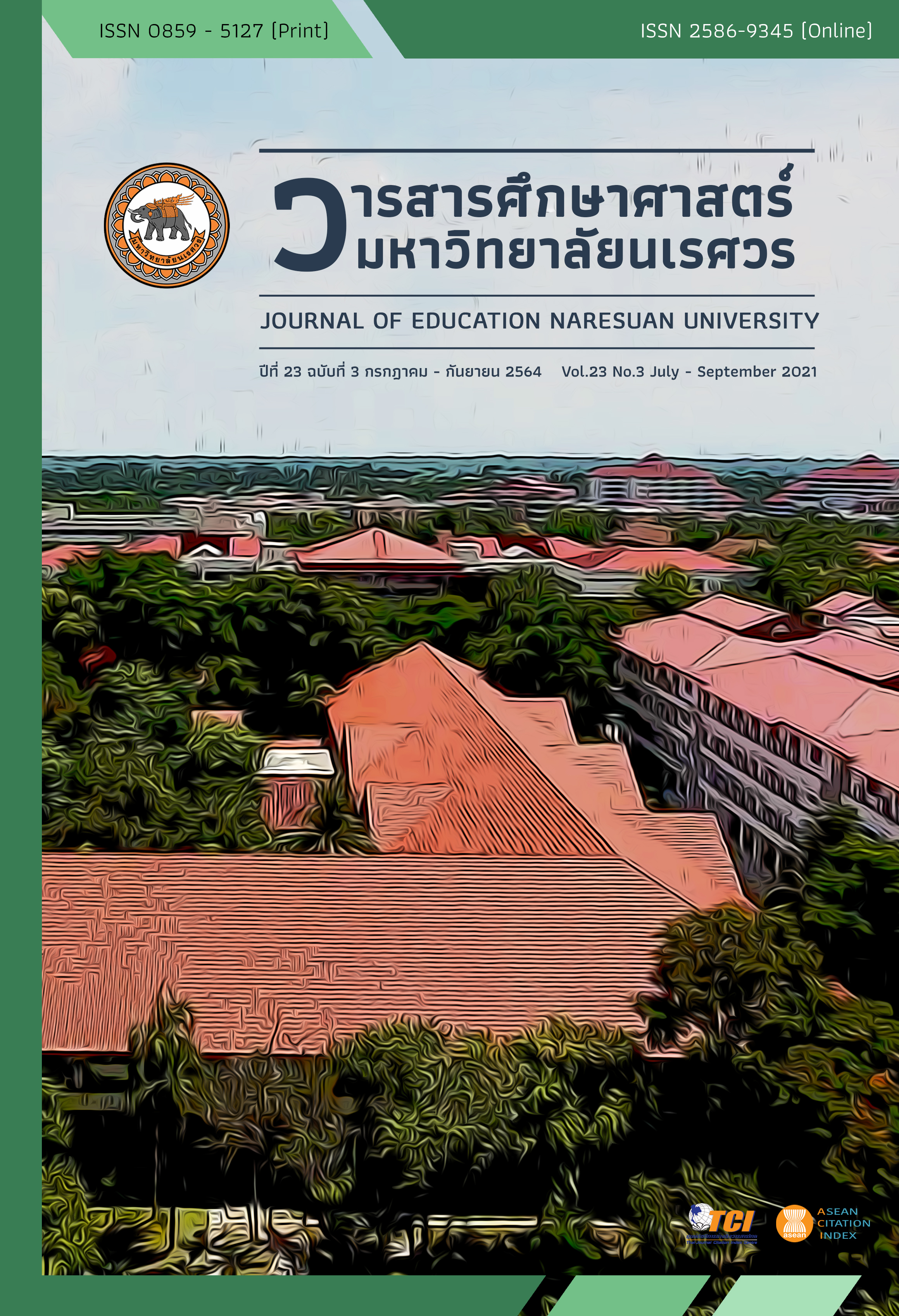AUGMENTED REALITY TECHNOLOGY DEVELOPMENT IN THE SCIENCE ON DIGESTIVE SYSTEM FOR GRADE 4 STUDENTS การพัฒนาสื่อเทคโนโลยีโลกเสมือนผสานโลกจริง วิชาวิทยาศาสตร์ เรื่อง ระบบย่อยอาหาร สำหรับชั้นประถมศึกษาปีที่ 4
Main Article Content
Abstract
The purpose of this research aims 1) to develop an augmented reality technology in the science on the topic digestive system, 2) to compare pre and post-learning achievement whereby the augmented reality technology in the science on digestive system, 3) to compare post-learning achievement between student groups whereby the augmented reality technology in the science on digestive system with control group that studies in a normal, and 4) to study satisfaction of students toward learning from augmented reality technology in the science of digestive system. The sample was 31 students, grade 4 from class 2 and class 3 from Siribenyalai School were selected in a sample group. The results showed that: 1) the analysis on quality of the technological media, Augmented Reality or AR in the science subject on the topic digestive system showed the result to be good overall. Considering the result in each aspect, font used and content aspect resulted to be excellent, graphic and quality of media component aspect resulted to be good. 2) A post-learning achievement of the augmented reality technology was higher than pre-learning have shown statistically significant difference at .05. 3) A post-learning achievement of digestive system augmented reality technology in the science class between experimental group was higher than control group that studies in a normal way have shown statistically significant difference at .05. And 4) satisfaction of learning from augmented reality technology was in high level.
Article Details
The owner of the article does not copy or violate any of its copyright. If any copyright infringement occurs or prosecution, in any case, the Editorial Board is not involved in all the rights to the owner of the article to be performed.
References
Butrkod, C. (2012). Critical situation of science teacher – IPST nagging government for measures: Outside the classroom lessons – teachers development – alteration of evaluation form advised in motivation – exemption of tax – other privileges. Retrieved June 6, 2017, from https://www.tcijthai.com/news/2012/30/scoop/1054 [in Thai]
Kongmanus, K. (2018). Digital learning tools: Ways of digital education ERA. Journal of Education Naresuan University, 20(4), 279-288. [in Thai]
Kuikrathok, S. (2008). Evaluate the difficulty and power of classification. Retrieved September 22, 2017, from https://www.gotoknow.org/posts/229336 [in Thai]
Limpinan, P. (2018). Using augmented reality (AR) for encouraging the retention of learning English vocabulary. Journal of Information Technology Management and Innovation, 4(2), 7-16.
Meesuwan, W. (2012). Augmented reality technology for learning. Journal of Education Naresuan University, 13(2), 119-127. [in Thai]
Meksamoot, A., Boonlue, S., & Tansatien, K. (2018). The development of the ability in Thai diphthong reading by the reading book which using augmented reality technology with gamifications technique for grade 3 students. Veridian E-Journal, Silpakorn University, 10(1), 550-564. [in Thai]
Ministry of Education. (2017). Learning standards and indicators for mathematic, science and geographic department in the social, religious and cultural studies. (Edited edition 2017) Referenced by core lesson plan for fundamental primary education 2008. Retrieved June 6, 2017, from http://opec.go.th/ckfinder/userfiles/files/general/123(2).pdf [in Thai]
Nuanmeesri, S. (2018). The augmented reality for teaching Thai students about the human heart. International Journal of Emerging Technologies in Learning (iJET), 13(6), 203-213.
Paisuwon, T. (2015). Effects of using multimedia Courseware controlled by the set program (program control) Thai affect the digestive system and retention to remember of students in grade 6 (Master thesis). Bangkok: Silpakorn University. [in Thai]
Praphin, C., Kongmanus, K., Chiranuparp, C., & Kaewurai, W. (2019). The development an instructional model for computer subject based on project-based leaning with social media to enhance information communication and technology literacy for upper primary students. Journal of Education Naresuan University, 21(1), 41-42. [in Thai]
Priyawathit, P., & Naphapong, W. (2016). Result of augmented reality code lessons about basic Chinese vocabulary for students in Matthayomsuksa 3 Wat Tanee Nara Samosorn School. Academic Service Journal, Songkla Nakarint University, 27, 9-17. [in Thai]
Rovinelli, R. J., & Hambleton, R. K. (1977). On the use of content specialists in the assessment of criterion-referenced test item validity. Dutch Journal of Educational Research, 2, 49-60.
Saekhow, N., & Prasertsaruay, S. (2015). Development of virtual world model for interactive multimedia instruction on exploring the computer world. VRU Research and Development Journal Humanities and Social Science, 10(1), 36-45. [in Thai]
Seels, B., & Glasgow, Z. (1998). Making instructional design decisions (2nd ed.). Upper Saddle River, NJ.: Merrill.
Srisa-ard, B. (2010). Preliminary research (5th ed.). Bangkok: Suweeriyasan. [in Thai]
Suphachan, S. (2014). Comparison of academic achievement by teaching the use of teaching Materials and teaching the E-Book: Analysis of business data. Journal of Yanasangvorn Research Institutes, 5(1), 57-66. [in Thai]
Suwannathada, N. (2013). Analysis of mixed form or instruction using mixed reality technology instructional media. RMUTP Research Journal, 7(1), 115-121. [in Thai]
Thongdee, W. (2010). The development of computer assisted instruction on body systems lesson for mathayosuksa 2 student of Suantangwittaya School, Suphan Buri Province (Master thesis). Bangkok: Silpakorn University. [in Thai]
Wongratana, C. (2010). Techniques for using statistics for research (12th ed.). Bangkok: Faculty of Education, Srinakharinwirot University. [in Thai]


